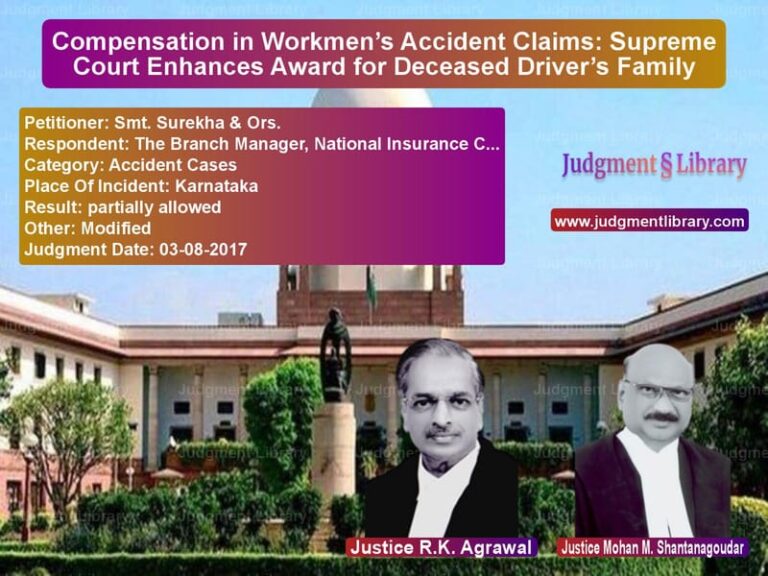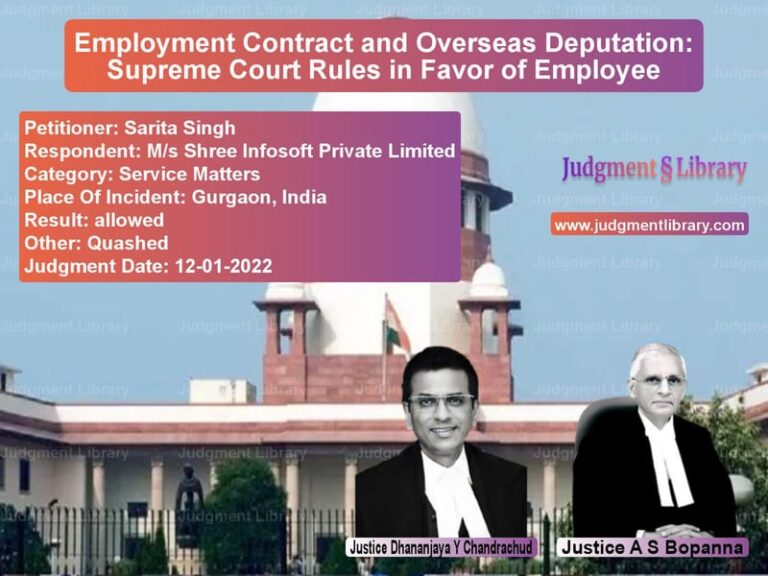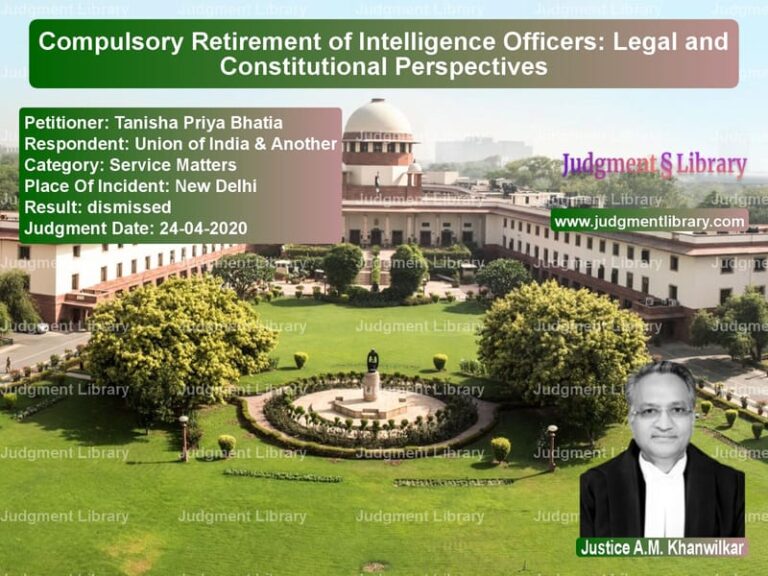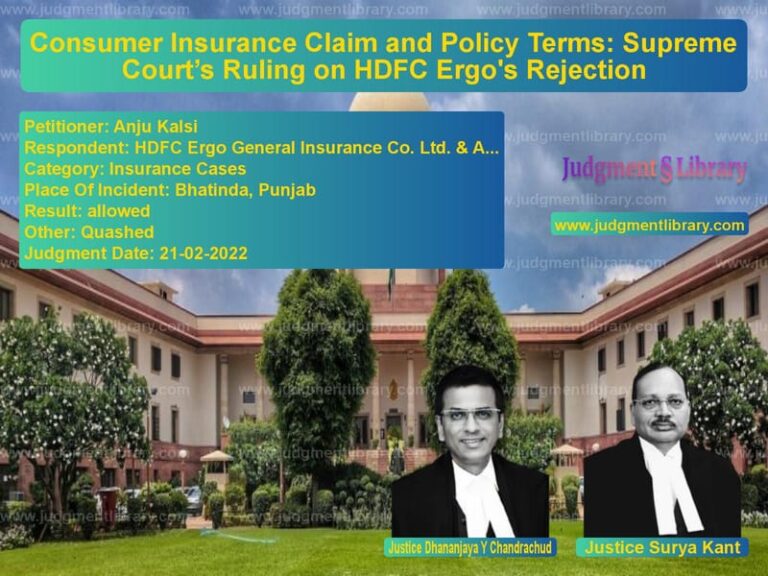Supreme Court Appoints Arbitrator in BHEL vs. Wexford Financial Dispute
The Supreme Court of India, in the case of M/S Wexford Financial Inc. Panama vs. Bharat Heavy Electricals Ltd. (BHEL), addressed a commercial dispute arising from a service provider agreement between the parties. The petitioner sought the appointment of a sole arbitrator under Section 11(5) and Section 11(12) of the Arbitration and Conciliation Act, 1996. The Court allowed the petition and appointed a sole arbitrator, reinforcing the principle of honoring arbitration agreements.
Background of the Case
The petitioner, M/S Wexford Financial Inc., is a company registered in Panama with a representative office in New Delhi. It is engaged in providing liaison services, facilitating contract procurement for companies, and assisting in pre and post-contractual obligations. The respondent, Bharat Heavy Electricals Ltd. (BHEL), is a government-owned entity engaged in manufacturing power equipment.
The dispute arose from a Service Provider Agreement executed between the parties on May 11, 2010. The agreement covered contractual and post-contractual services related to a project called the “Sulaymaniah Gas Power Project” in Kurdistan. The petitioner claimed that BHEL had agreed to pay 1.1% of the contract value as an agency fee, which was not honored in full.
Key Legal Issues Considered
- Was there a valid arbitration agreement between the parties?
- Did disputes fall within the scope of the arbitration clause?
- Was the claim barred by limitation?
- Could the arbitration clause be enforced despite objections from the respondent?
Arguments from Both Sides
Petitioner’s (Wexford Financial) Arguments
- “The Service Provider Agreement explicitly included an arbitration clause (Article 7).”
- “BHEL agreed to pay 1.1% of the contract value but failed to fulfill its contractual obligation.”
- “Multiple reminders for payment were ignored, leading to disputes necessitating arbitration.”
- “The respondent cannot deny arbitration when a valid agreement exists.”
Respondent’s (BHEL) Arguments
- “The notice for arbitration served by the petitioner was not properly issued.”
- “The claim made by the petitioner is barred by limitation.”
- “The petitioner failed to fulfill its primary obligation under the agreement.”
- “The arbitration clause does not apply in this situation as the petitioner has no legitimate claim.”
Supreme Court’s Judgment
The Supreme Court ruled in favor of the petitioner and appointed Ms. Justice Rekha Sharma, former Judge of the Delhi High Court, as the sole arbitrator. The Court made the following observations:
- “There exists a valid arbitration agreement between the parties.”
- “Disputes have arisen that fall within the arbitration clause’s scope.”
- “The issue of limitation is a question to be decided by the arbitrator, not the Court.”
- “The arbitration agreement must be honored, and disputes must be resolved as per the agreed mechanism.”
Analysis of the Judgment
The Supreme Court reinforced key principles in arbitration law:
- Competence of the Arbitrator: The Court reaffirmed that issues such as limitation, adequacy of service, and payment obligations must be decided by the arbitrator, not the Court.
- Binding Nature of Arbitration Agreements: The ruling emphasized that when parties have agreed to arbitration, courts must honor the agreement unless exceptional circumstances exist.
- Judicial Intervention Limited to Appointment: The Supreme Court reiterated that its role in arbitration matters is limited to appointing arbitrators when disputes fall within a valid arbitration clause.
Key Directives Issued by the Supreme Court
- Appointment of Arbitrator: Justice Rekha Sharma was appointed as the sole arbitrator.
- Disputes to be Resolved by Arbitration: All claims and counterclaims must be resolved through arbitration.
- Legal Arguments Reserved for Arbitrator: The arbitrator will decide on the merits of the claim, including limitation issues.
- Exclusive Jurisdiction: The seat of arbitration was designated as New Delhi.
Implications of the Judgment
The ruling strengthens the enforcement of arbitration agreements and has significant implications for contract enforcement in India:
- Ensures parties honor arbitration clauses in commercial contracts.
- Encourages dispute resolution through arbitration, reducing judicial backlog.
- Reinforces India’s commitment to arbitration-friendly policies in line with global standards.
Conclusion
The Supreme Court’s decision in Wexford Financial Inc. vs. BHEL is a landmark ruling in arbitration law, reaffirming the primacy of arbitration agreements in commercial contracts. The judgment ensures that contractual obligations are enforced efficiently, promoting a stronger legal framework for arbitration in India.
Don’t miss out on the full details! Download the complete judgment in PDF format below and gain valuable insights instantly!
Download Judgment: MS Wexford Financia vs Bharat Heavy Electri Supreme Court of India Judgment Dated 13-07-2016-1741873269096.pdf
Direct Downlaod Judgment: Direct downlaod this Judgment
See all petitions in Arbitration Act
See all petitions in Dispute Resolution Mechanisms
See all petitions in Enforcement of Awards
See all petitions in Judgment by T.S. Thakur
See all petitions in Judgment by R. Banumathi
See all petitions in Judgment by Uday Umesh Lalit
See all petitions in allowed
See all petitions in settled
See all petitions in supreme court of India judgments July 2016
See all petitions in 2016 judgments
See all posts in Arbitration and Alternate Dispute Resolution Category
See all allowed petitions in Arbitration and Alternate Dispute Resolution Category
See all Dismissed petitions in Arbitration and Alternate Dispute Resolution Category
See all partially allowed petitions in Arbitration and Alternate Dispute Resolution Category







